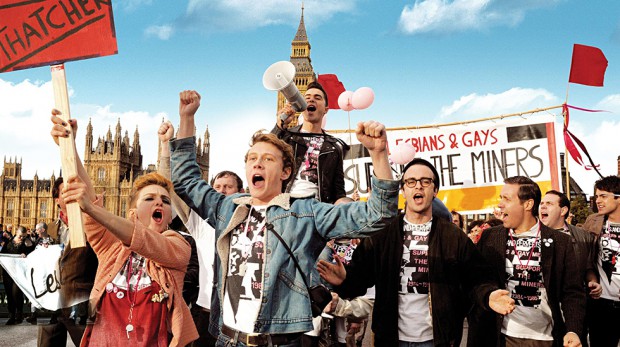
Starring Bill Nighy, Imelda Staunton, Dominic West, Ben Schnetzer
When a film starts with Solidarity Forever and ends with Billy Bragg it is not hard to guess its political leanings. What is a surprise is how funny, uplifting and inspiring Pride is along the way, as a rather standard (although well executed) British comedy gets a large dose of social conscience.
It’s 1984 and Thatcher’s Britain is in the grip of the miner’s strike. Seeing similar tactics of marginalisation and victimisation that have been used against them, a young group of gay and lesbian activists act in solidarity with the miners and start raising money for their cause. This unlikely combining of interests causes tension and the group must struggle for acceptance. Rejected by the Union, they seek to support the miners directly by approaching one small Welsh village. What follows is a clash of cultures and a struggle for acceptance from both sides. The results of which were instrumental in shaping the social landscape of Britain.
To expect Pride to tell the full story of this struggle is a naive expectation. No doubt it glosses over history, presenting a light comedic face to events that would have been less clear cut and much more visceral. A wealth of dramatic potential likely lies for the next film maker to visit that well. However, this is a crowd pleaser, a working class comedy, and in that regard Pride fulfils its role admirably, coming across as if Ken Loach had directed Billy Elliot or The Full Monty. At it’s core this is a film about acceptance, equality and fraternity. A celebration of those differences, and finding common ground. It may be lightweight but it is still an inspiring message well delivered.
The ensemble cast plays a mixture of historical figures and character archetypes. This gives a large amount of plot threads for director Matthew Warchus to handle, as he gives each of them a small character arc. It is a task well handled, each of them getting enough development without the film feeling bloated. In this regard he is helped by the great collection of jobbing British actors. Ben Schnetzer puts in an effortless performance as flamboyant firebrand Mark Ashton, Dominic West (McNulty in The Wire) gets to camp it up, almost stealing the show with one dance number, and it is seemingly enshrined in legislation that any movie of this ilk must have Bill Nighy or Imelda Staunton in it (who are both wonderful, as to be expected).
Ultimately Pride may be a little sugar coated and tug at the heartstrings, but it is also intelligent enough to realise this, undercutting its saccharine elements with the right pitch of darkly humorous one liners and keeping aware of the pressures both social groups were living under at the time. The result may not be entirely accurate, but entertaining and uplifting nonetheless. A genuine feel good movie for those that lean a little to the left.
DAVID O’CONNELL